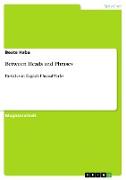- Start
- Between Heads and Phrases
Between Heads and Phrases
Angebote / Angebote:
Magisterarbeit aus dem Jahr 2009 im Fachbereich Englisch - Grammatik, Stil, Arbeitstechnik, Note: 2, 0, Bergische Universität Wuppertal, Sprache: Deutsch, Abstract: Phrasal verbs, generally speaking, consist of verbs and particles which may be an adverb and a preposition to form more or less coherent unit with the verb. From the perspective of a learner of English as a foreign language (EFL), particle verbs are not only an important feature of English grammar whose degree of mastery reveals the command of lexicon and style. But, due to their heterogeneity and complexity, they are difficult to master and provide a vast potential for mistakes but they are also very complex and heterogeneous. According to Darwin and Grey (1999:65), many particle verbs have entirely idiomatic meaning although both parts of the construction seem very familiar to the learners. This idiomaticity leads to avoidance or to errors because phrasal verbs constitute "a syntactic [and semantic] oddity in the language" to include the quotation by Darwin and Gray (1999:65). This is also the reason why phrasal verbs are difficult to describe.
This thesis pursues two aims: first of all, it outlines the interdependency between the semantic and syntax in phrasal verb. If the particles leave their literal domain, they lose their lexical autonomy as they attach to the verbal head. Literal particles, like prepositions, are syntactically and semantically autonomous. Therefore, they may be treated as a subclass of the category preposition. This is not possible with particles in phrasal verbs which in facts are grammaticalized. This aspect seems to be neglected by the generative grammarians who concentrate on the explanation of particle movement. The questions which are dealt with are, above all, how to account for the particle movement and if the particle moves away from the verbal basis, which constituent then does assign the Case to the object noun phrase. One observes that there have developed different "schools" or direction of accounts, for example Johnson (1991) attempts to explain phrasal verbs in terms of a complex head analysis. He assumes that verb and particle form one lexical item. Kayne (1985) applies Small Clause analysis starting from the assumption that particle verbs and resultative constructions are similar. Particles are heads of a Small Clause with the nominal objects as their subjects. [...]
Folgt in ca. 10 Arbeitstagen
